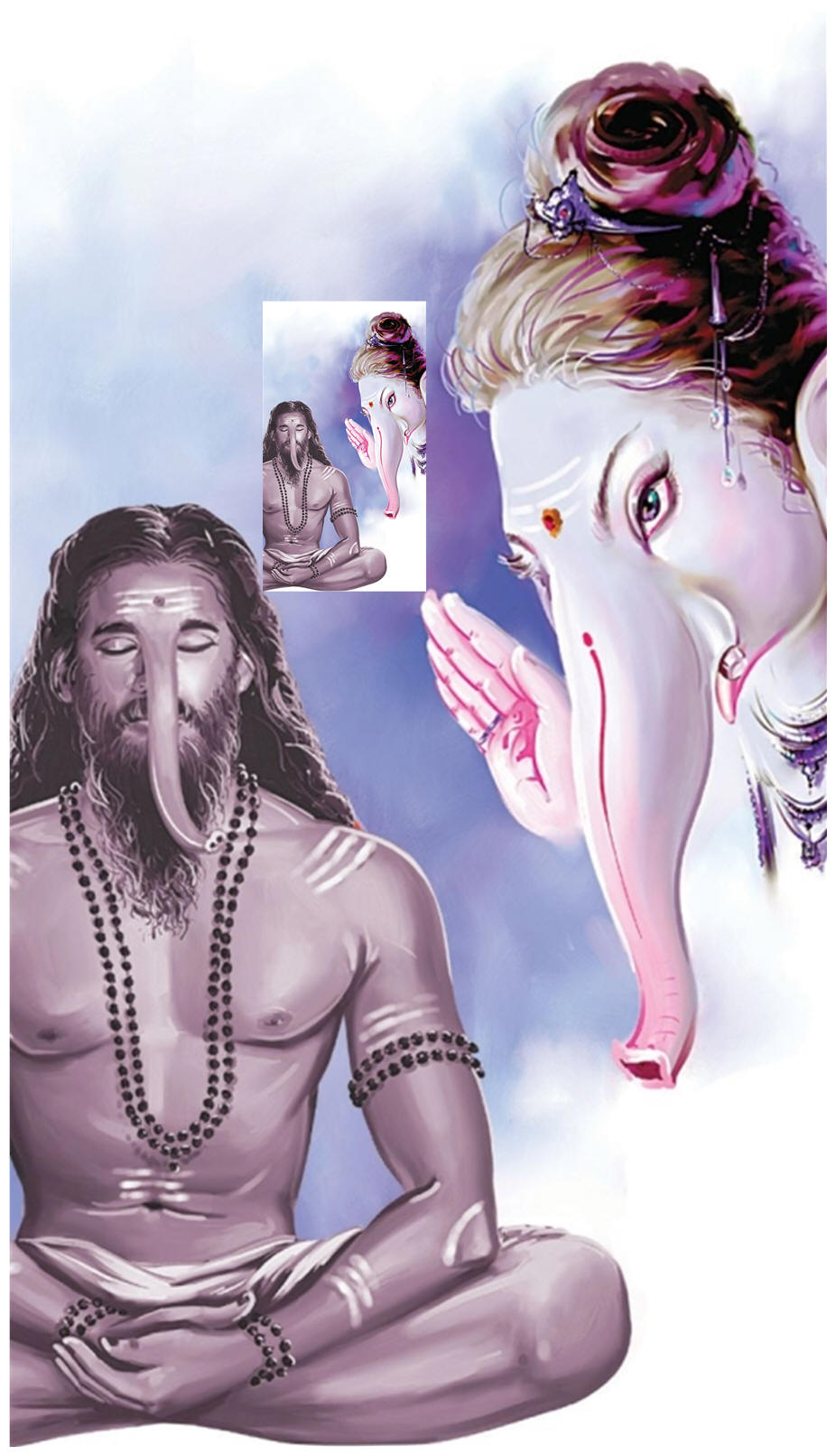Vinayaka the Remover of Obstacles
Published:08 Apr 2019 8 PMUpdated:08 Apr 2019 8 PM Sakthi Vikatan
சக்தி கொடு! - புதிய தொடர் = Give Me Sakthi: A New Series
வி.ஆர்.சுந்தரி, ஓவியம்: பாரதிராஜா Author V. V. R. Sundari. Images: Bharathiraja

1. Greetings to the readers. The elders say there is no growth of wisdom without queries. OK, when do the questions arise? With prodigious reading and discussion on literary topics, we intend to read more and talk even more.
2. Yes, I plan to learn from you what I never knew. I will share with you what I heard from the elders and what I learned from theological treatises (or sacred texts). All are about spirituality: Ways of worship, observances like fasting, the greatness of the temple, exposition of Tattvas, spiritual doubts and dilemmas, and more. We have a plethora of knowledge and wisdom coming our way.
3. A far as I am concerned, this is Satsaṅgamam (Association with the good). Association with the elders confers wisdom. That is clear wisdom, giving the Sakthi to accomplish all.
4. Come one and all! In this issue, let us begin as the servitors of the first, the foremost, and the wholesome God Vināyakaṉ. He expiates all our sins and indebtedness (of all kinds). Let us look at Gaṇapathy vow.
5. Take the Kural 270.
Kural 270:
இலர்பல ராகிய காரணம் நோற்பார்
சிலர்பலர் நோலா தவர்.
இலர் பலர் ஆகிய காரணம் The reason for the powerless (= the needy) being too many
நோற்பார் (Ascetic) சிலர் நோலாதார் (= Those not doing penance) பலர் The ascetics are a few and the inobservants (?Agnostics) are many.
270. The reason for a plethora of the powerless and the needy is because of fewer ascetics and many agnostics.
A vow is removing wants and satisfying the needs, said Valluvar. The vows have an extraordinary purpose of keeping us in good stead by giving us imperturbable composure and firmness and by bringing to fruition our good thoughts.
6. In that way, it showers on us the rain of mercy and saves us by paying off our debts. It frees us from the sins of our ancestors (manes) and blesses us with the satisfaction of our needs. Let us look at such a gracious act.
7. Purusuṇdi Muṉivar impressed upon us the greatness of this vow (Viratam) deservingly made to Piḷḷaiyār. He received the facial proboscis, so characteristic of Vināyakar by performing Tapas to him. Between Muni's eyebrows, a small proboscis developed, giving him a simulacrum of Piḷḷaiyār with a proboscis. That earned him a holy moniker, 'Purusuṇdi' Muṉivar ('Purusuṇdi' = Puru + Sundi = Brow + small proboscis). 'Brow' in English is Puru (புருவம்) in Tamil and Bhrū ( भ्रू = Bhrū, brow, eyebrow) in Sanskrit. The words (Bhrū, Puru, and brow) are cognate.
8. Purusuṇdi Muṉivar was the foremost among the disciples of Vināyaka devotee Mudhgala Muṉi. Purusuṇdi Muṉivar received accolades from his Guru and Darśan from Vināyakar. Such was his greatness. Once Narada Muṉi came looking for him.
9. Narada: "O Purusuṇdi Muṉivarē! You are in ecstasy having the form of Vināyakar. But your manes (dead ancestors) are suffering in the hell by name Kumbhī Pākam. Look for ways to release them from there." Saying such heart-wrenching words, Narada left his presence.
10. Purusuṇdi Muṉivar, a Direct Perceiver of Vināyakar, treats people equally, whether they are related or not. But the Muṉivar paid attention to Narada's oracle and performed 'Saṅkatahara Chaturthi Viratam' (A fast observed in honor of Gaṇēśa or Vināyaka to remove trouble or evil on the 4th digit day of the moon). As a fruit of the observance, the manes obtained release from the Kumbīka hell. The manes paid tributes to Purusundi Muṉi and blessed him profusely with their 'heart, mind, and soul.'
11. This Viratam has the power to free a person from Pitru curses, and Pitru Dosha (Pitru Dosha is a fault or trouble that comes because of failure to pacify the souls of the manes.) The moon has a strong association with this Viratam (vow). Kaśyapa Muṉi explains this wonderfully.
12. Once, Brahmadeva and other deities assembled in Kailās. Chandra derisively laughed at Brahmadeva. Noticing it, Vināyaka became angry and cursed him, "With the dimming of your light, you will disappear from this world."
13. Chandra's light faded, and he regretted his mistake. The Devas took pity on Chandra, went to Piḷḷaiyār and supplicated to him to get Chandra out of his dim and grim predicament. Vināyaka addressed Devēndra and others, "Devēndra! It is noble to forgive a person who realized his mistake. I dispense remediation from the curse. In the month of Āvaṇi (September-October: middle to middle), let no one see the waxing moon on the 4th day. If anyone looks at the moon on that day, troubles and undeserved slander befall the witness. No harm will come on looking at the moon on other days. Let Chandra's sadness end."
14. The curse seizing Chandra, dissipated. But a thought arose in the mind of Chandra. It is because of me that the gods asked for forgiveness. Is it not that I made a mistake? Thinking of receiving expiation, Chandra went to Sarvasiddhikaram and performed severe penance with meditation for 22 years.
15. Gaṇapathy was joyous and appeared before Chandra and said, "Chandra! I conferred all the desired boons earlier. I will confer on you another boon at this moment. Let the devotees desiring to ward off their troubles offer worship to me and you on Aṅgāraka (Mars) Chaturthi holy day at moonrise. Let one digit of the moon (Chandra) shine on my holy head for all my devotees coming to worship me and incidentally worship you also. Vināyakar wore one digit of the moon on his head and earned the holy moniker, "Bāla Chandra Vināyakar."
16. What is the reason five-handed Vināyaka (= four hands and one proboscis) include Aṅgārakaṉ (Mars)?
17. There is a sacred story behind it.